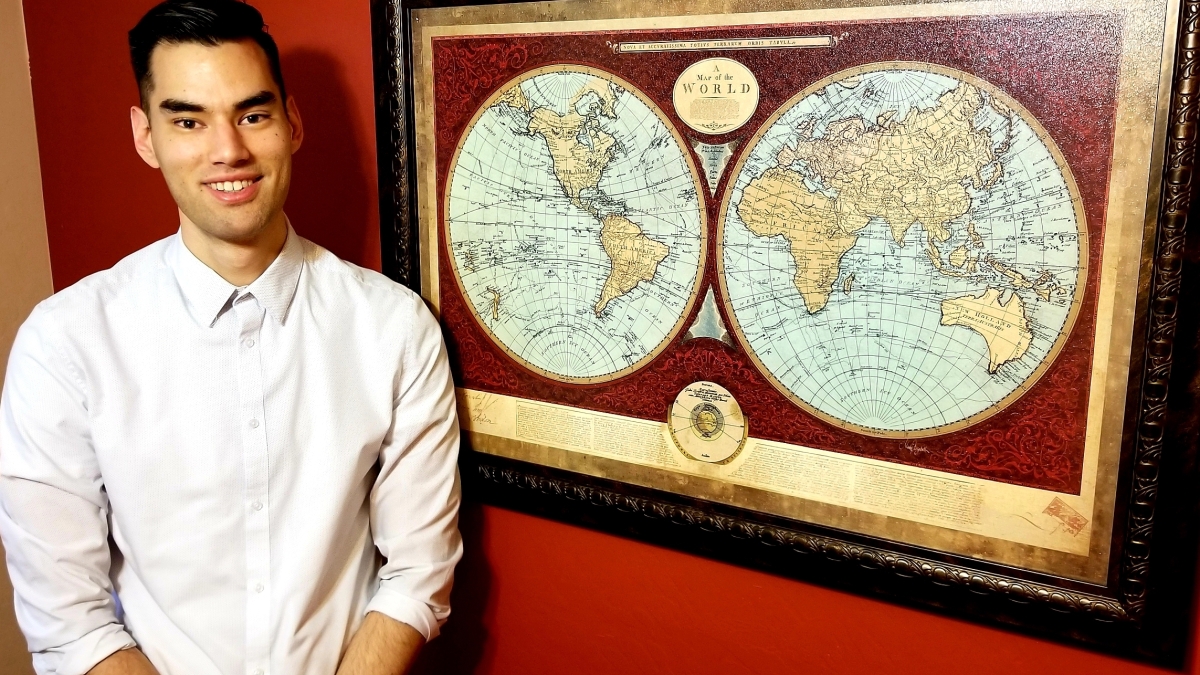ASU grad, Army veteran eager to move the needle on complex social, global issues

ASU graduate Steven Henderson.
Editor’s note: This is part of a series of profiles for fall 2017 commencement. See more graduates here.
Steven Henderson, a top political science graduate from ASU’s Polytechnic campus, has always had an interest in government, politics, and international relations.
“My father, now retired from the federal government, taught me a lot about it at a young age,” said Henderson. “I was fascinated learning about government procedures, about the role of each government branch, and a memorable moment of my childhood was visiting the National Archives Museum in Washington, D.C., actually seeing the documents that shaped this country and built what we have today.
“I knew even then that when I grew up I wanted to be in some sort of government role. I have always wanted to be in a position to have a lasting impact on others while providing service to the community.”
As Henderson grew up, his interest in social studies, history, and government courses bolstered his passions, and his focus expanded to global affairs.
“I knew I didn’t want to just read about issues or watch what was happening, I wanted to do something,” he said.
After graduating from Mesa High School, Henderson enlisted in the U.S. Army. He said his military service further informed his college and career plans.
“I was a military police officer stationed at Fort Campbell,” Henderson said. “This unique installation is in both Tennessee and Kentucky, which means that laws of both states are enforced. The interaction among different institutions made me curious as to how the design and implementation of these policies occurred. Further, dealing with the public and local law enforcement agencies on a near-daily basis reinforced my determination to contribute to public service in the civilian sector."
When he graduates Dec. 11 from ASU’s College of Integrative Sciences and Arts, he’ll also have completed a minor in organizational leadership. He plans to earn at least two other degrees from the university.
“From my first course in political science at ASU to my last,” he said, “the information and knowledge I’ve gained has been a constant reminder that I’ve chosen the correct path.”
Question: Why did you choose to attend ASU?
Answer: As ASU continues to grow and expand, it’s achieving national renown. ASU provides a learning environment where students can feel engaged in their discipline. I chose ASU because I wanted to be a part of this engaged learning and also because of the university’s concentration on student success.
Q: What’s something you learned while at ASU — in the classroom or otherwise — that surprised you, that changed your perspective?
A: I now understand that each of us comes from a different background that provides us with different perspectives, experiences, and insights. When seeking to make changes in this world, we too often let these differences hinder human progress instead of using these differences to solve today’s problems and develop the foundation for solving tomorrow’s. We are bounded by our own rationality and tend to make too many decisions that are satisficingSatisficing (derived from satisfy and suffice) is a strategy in decision-making that searches through possible solutions for a satisfactory result instead of an optimal one. rather than optimal.
Q: Looking back on your ASU career, do you see an interesting or defining moment that stands out for you?
A: The most defining moment of my ASU career occurred during my final semester, in the course ISS 456: Culture, Conflict, and War with Dr. Keith Hollinger. As a class, we started from the ground up by analyzing the conflict of North Korea and we culminated with developing a conflict assessment plan. The analysis, research, and discussion made me realize that I have a passion for conflict resolution and it has helped me direct my plans for continuing education.
Q: What are your plans after graduation?
A: I plan to complete an additional major in software engineering and then pursue the master’s in integrative social science. I hope to combine these disciplines to create a new line of communication between the social sciences and STEM, to contribute to solving complex social and global issues in an integral way.
Q: If someone gave you $40 million to solve one problem on our planet, what would you tackle?
A: Information is the most powerful weapon that exists in the world. There are a number of countries with governments that strictly prohibit access to certain information. Many of these countries, such as Eritrea and North Korea, enforce severe punishment on journalists or those with possession of non-authorized materials. With $40 million, I would initiate steps to get external information into the hands of citizens.
Q: What was your favorite spot on campus, whether for studying, meeting friends or just thinking about life?
A: The classroom, because it’s where the learning and experiences are the most impactful. Alternatively, the Poly academic center which is the hub for studying, tutoring, and career needs.
More Law, journalism and politics
Can elections results be counted quickly yet reliably?
Election results that are released as quickly as the public demands but are reliable enough to earn wide acceptance may not…
Spring break trip to Hawaiʻi provides insight into Indigenous law
A group of Arizona State University law students spent a week in Hawaiʻi for spring break. And while they did take in some of the…

LA journalists and officials gather to connect and salute fire coverage
Recognition of Los Angeles-area media coverage of the region’s January wildfires was the primary message as hundreds gathered at…

